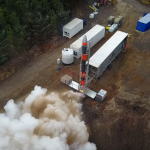Mammals including humans could shrink in size in the future as a response to a hotter climate, a fossils expert has suggested.
Professor Steve Brusatte, a palaeontologist at Edinburgh University, told Sky News fossil records showing how mammals have responded to previous temperature changes could hold clues about how they might respond in the future.
In the past when the Earth has warmed, “oftentimes mammal species get smaller in response”, he told Sky News’ Kay Burley.
Prof Brusatte cited an example from around 55 million years ago, when, after a “huge global warming spike” about 40% of mammal species in the fossil records shrank in size.
Speaking to mark the publication of his new book, The Rise and Reign of the Mammals, the fossil expert suggested that in the future mammals including humans could do the same.
He said fossil records detail many examples of humans finding themselves on islands with few resources and a harsh environment, and humans getting smaller in response.
“So if you put these pieces together, it’s an interesting idea,” he said.
‘Alarming lack of credibility’ in net zero climate promises, major global analysis finds – but there is some good news
New Zealand unveils plan to slap a tax on cow and sheep burps to cut greenhouse gas methane
Equinor: We are not investing enough in renewables, fossil fuel giant admits
This wouldn’t happen overnight, but in “many dozens, hundreds of generations’ time”, he continued.
“This isn’t alarmism. This isn’t scare-mongering. This is just looking at the fossil record and saying, ‘look, throughout the history of the Earth, the temperature has changed a lot’.
“What’s happening now is not new – the causes are new because humans are causing it. But in the past, global warming has happened and species have had to respond and species get smaller. So maybe this might happen in the future,” he added.
Watch the Daily Climate Show at 3.30pm Monday to Friday on Sky News, the Sky News website and app, on YouTube and Twitter.
The show investigates how global warming is changing our landscape and highlights solutions to the crisis.
Subscribe to ClimateCast on Spotify, Apple Podcasts, or Spreaker






















